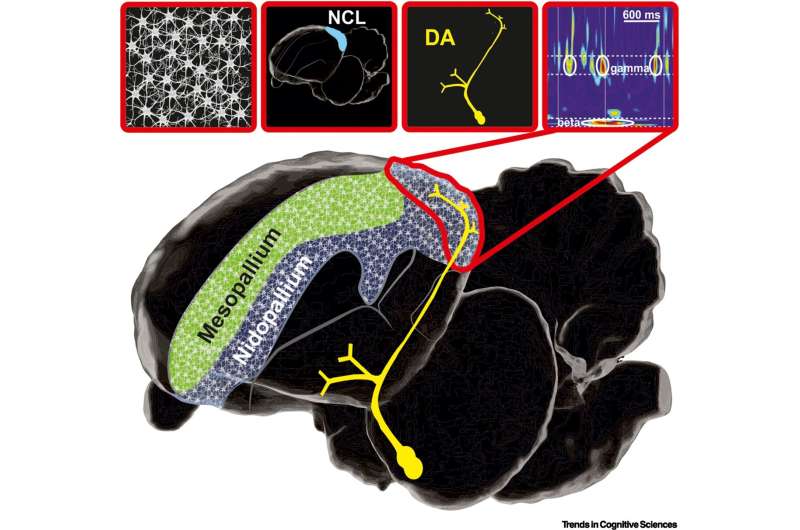This article has been reviewed according to Science X's editorial process and policies. Editors have highlighted the following attributes while ensuring the content's credibility:
fact-checked
trusted source
proofread
What makes birds so smart?

Researchers at Ruhr University Bochum explain how it is possible for the small brains of pigeons, parrots and corvids to perform equally well as those of mammals, despite their significant differences.
Since the late 19th century, it has been a common belief among researchers that high intelligence requires the high computing capacity of large brains. They also discovered that the cerebral cortex as typical of mammals is necessary to analyze and link information in great detail.
Avian brains, by contrast, are very small and lack any structure resembling a cortex. Nevertheless, scientists showed that parrots and corvids are capable of planning for the future, forging social strategies, recognizing themselves in mirrors and building tools. These and similar aptitudes put them on a par with chimpanzees.
Even less gifted birds, such as pigeons, learn orthographic rules that enable them to recognize typos in short words or classify pictures according to categories such as "impressionism," "water" or "man-made." How do they do it with such small brains and without a cortex? With their article published in Trends in Cognitive Science, Professor Onur Güntürkün, Dr. Roland Pusch and Professor Jonas Rose from Ruhr University Bochum come closer to solving this more-than-one-hundred-year-old puzzle.
Similar brain mechanisms
The authors of the study show that birds have developed four similar innovations for intelligence during their evolution, independently of mammals.
First, birds have many more nerve cells in their small brains than previously believed. Corvids in particular place this extra portion of computing capacity in those areas of the brain that are most important for cognition.
The second reason is that birds have a specialized brain structure that is similar to the prefrontal cortex in mammals and is crucial for abstraction and planning. This brain region is moreover exceptionally large in intelligent birds and mammals.
Third, birds and mammals alike have a system that uses the neurotransmitter dopamine to constantly feedback the quality of their decisions to the prefrontal system. As a result, the prefrontal computational processes continuously adapt to changing situations and the success or failure of the decisions of the individual.
Finally, birds have independently developed a very similar working memory to temporarily hold things in short-term memory. Like jugglers who constantly keep many balls spinning in the air, birds and mammals use a flexible activity pattern of their nerve cells to keep a lot of information active at the same time.
Neuronal basis of intelligence
All these neuronal properties appear to have evolved in parallel and independently of each other in birds and mammals. There is therefore a strong case for assuming that they are among the basic brain mechanisms that enable cognitive performance.
Consequently, the comparative study by the Bochum neuroscientists of the Collaborative Research Center "Extinction Learning" at Ruhr University Bochum is another jigsaw piece in the puzzle of the general neurobiological principles of intelligence.
More information: Onur Güntürkün et al, Why birds are smart, Trends in Cognitive Sciences (2023). DOI: 10.1016/j.tics.2023.11.002
Provided by Ruhr-Universitaet-Bochum




















